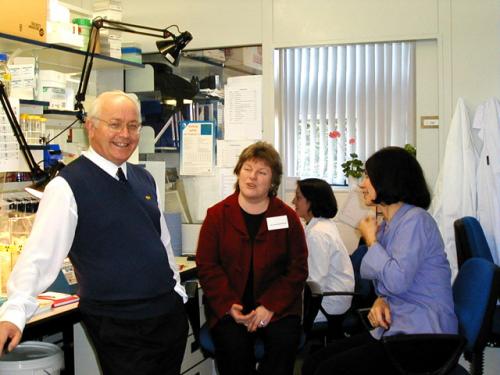
Unit Budget Increased to£7.5M after 5 Year Review
The MRC Council has increased the Unit's funding by £3 million bringing its budget for 5 years to almost £7.5 million. The Unit's Director, Sir Philip Cohen, said: "This is excellent news which acknowledges the Unit's pre-eminence in this field worldwide and enables us to enhance a cutting-edge research programme which has implications for improving health."
The cash boost came on the back of the Unit's five yearly review, which also awarded all the Unit's programmes the highest alpha- plus rating. Over the last five years the Unit has made a major contribution to the elucidation of one of the major biochemical pathways by which insulin exerts its effects. The failure of insulin to transport blood glucose into glycogen - its storage form in muscle and liver - is the cause of Type II diabetes, which affects 3-5% of the population of Britain, and over 150 million world-wide. But due to its long-term side effects, such as increased risk of heart attack, kidney failure and blindness, it accounts for more than 10% of all health care expenditure. The incidence of type II diabetes is expected to double over the next 20 years.
The Unit's research has suggested new opportunities for the development of improved drugs to treat diabetes and has assisted GlaxoSmithKline in the development of compounds that mimic the ability of insulin to convert glucose to glycogen by switching off an enzyme called GSK3 that the Unit discovered some years ago. The latest award will bring the number of scientists working in the MRC Unit to almost 100.
The Unit's work also has implications for understanding cancers and chronic inflammatory diseases and led to five pharmaceutical companies AstraZeneca, Boehringer Ingelheim, GlaxoSmithKline, Novo Nordisk and Pfizer investing £7.6million in July 1998 to set up the Division of Signal Transduction Therapy (DSTT). At Bio 1999, the major annual conference of the Biotechnology Industry, Pfizer described the DSTT as their most important academic collaboration world-wide and awarded Sir Philip their Innovation Prize for Europe.
One of the Unit's Team Leaders, Dario Alessi, was awarded the Colworth Medal of the British Biochemical Society, the premier research award for young scientists under the age of 36. Dario was also named European Young Investigator of the Year by the German company, Eppendorf.
The cash boost came on the back of the Unit's five yearly review, which also awarded all the Unit's programmes the highest alpha- plus rating. Over the last five years the Unit has made a major contribution to the elucidation of one of the major biochemical pathways by which insulin exerts its effects. The failure of insulin to transport blood glucose into glycogen - its storage form in muscle and liver - is the cause of Type II diabetes, which affects 3-5% of the population of Britain, and over 150 million world-wide. But due to its long-term side effects, such as increased risk of heart attack, kidney failure and blindness, it accounts for more than 10% of all health care expenditure. The incidence of type II diabetes is expected to double over the next 20 years.
The Unit's research has suggested new opportunities for the development of improved drugs to treat diabetes and has assisted GlaxoSmithKline in the development of compounds that mimic the ability of insulin to convert glucose to glycogen by switching off an enzyme called GSK3 that the Unit discovered some years ago. The latest award will bring the number of scientists working in the MRC Unit to almost 100.
The Unit's work also has implications for understanding cancers and chronic inflammatory diseases and led to five pharmaceutical companies AstraZeneca, Boehringer Ingelheim, GlaxoSmithKline, Novo Nordisk and Pfizer investing £7.6million in July 1998 to set up the Division of Signal Transduction Therapy (DSTT). At Bio 1999, the major annual conference of the Biotechnology Industry, Pfizer described the DSTT as their most important academic collaboration world-wide and awarded Sir Philip their Innovation Prize for Europe.
One of the Unit's Team Leaders, Dario Alessi, was awarded the Colworth Medal of the British Biochemical Society, the premier research award for young scientists under the age of 36. Dario was also named European Young Investigator of the Year by the German company, Eppendorf.

